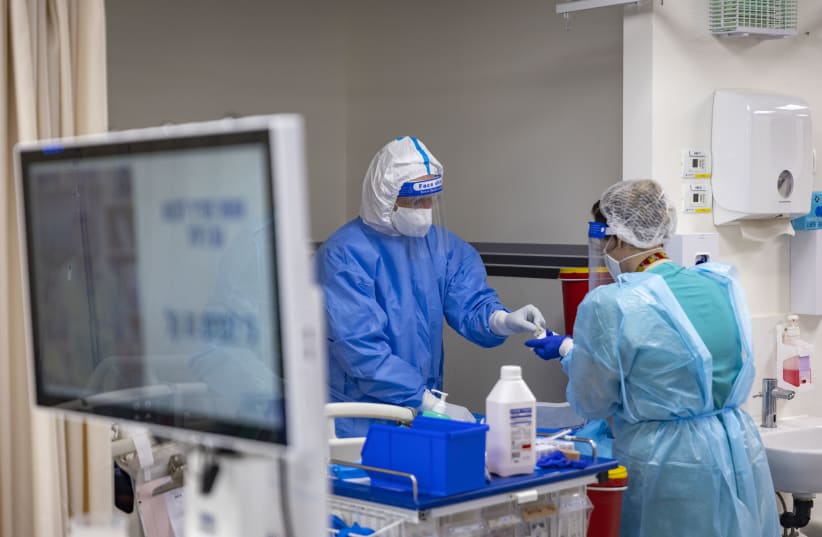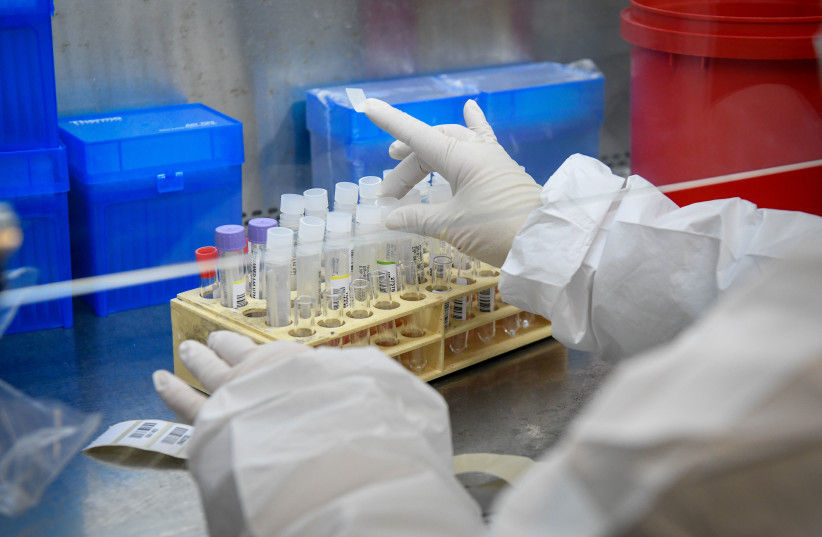A total of 83,663 cases of COVID-19 were detected in Israel over the last day, the highest number yet, the Health Ministry reported Monday. There were 813 patients in serious condition, and 163 of them were intubated, it said.
The last time there were that many serious cases was in January-February 2021, before coronavirus vaccines became widely available to the public.
Of the current serious cases in Israel, 259 are unvaccinated, 100 are partially vaccinated, and 429 are fully vaccinated, with the status of the remainder unknown, the Health Ministry reported. The vast majority of serious cases are people over the age of 60, while some 150 people younger than 60 are in serious condition, it said.
Almost a quarter of all COVID-19 tests (23.2%), both PCR and antigen, returned a positive result. There were 531,430 active cases. Overall, 2.38 million Israelis have tested positive for the disease since the start of the pandemic.
COVID has claimed 8,480 lives in Israel, and 126 deaths were recorded over the last seven days, an increase of roughly 106% from the previous week.
The number of people currently in isolation continues to put a burden on both the healthcare system and other services, including public transportation.
Of the 197,849 Israelis in self-isolation, 8,680 are members of the health sector. Bus and train services continue to experience delays and changes to their schedules due to worker shortages.
Joining the ranks of politicians to be infected with the virus of the last few weeks were Tourism Minister Yoel Razvozov (Yesh Atid) and Deputy Minister in the Prime Minister’s Office Abir Kara (Yamina). They both said they felt well and were not experiencing any symptoms.
Coalition MKs Idit Silman (Yamina), Mazen Ghnaim (Ra’am) and Mansour Abbas (Ra’am) also said they had tested positive for COVID-19 on Monday morning. They were joined later in the day by MK Boaz Toporovsky (Yesh Atid) and Deputy Education Minister MK Meir Yitzhak Halevi (New Hope), who said he felt well and attributed his mild symptoms to the success of the vaccine.
A new coronavirus law was approved by the Constitution, Law and Justice Committee on Monday evening and was to be brought to the Knesset plenum for a vote.
The law calls for the restoration of parliamentary oversight regarding the government’s decisions on COVID-19 and places limits on its ability to introduce new pandemic-related restrictions.
Whereas the pandemic is classified as a state of emergency, the new law differentiates between an active coronavirus wave and the time in between waves, when cases are still being registered but at a much lower rate.
The new law, which will come into effect on February 1, will consider the interim period to be a “special health situation,” with only the waves being considered to be a state of emergency.
Therefore, should a government body wish to introduce new restrictions, or remove or change preexisting ones during a special health situation, the usual laws will apply, where regulations can only be activated with prior parliamentary approval. They must be submitted to the committee at least five days before coming into effect.
During a state of emergency, regulations can be entered into effect without prior committee approval, which can be given in retrospect. The period of time granted to the committee to discuss the regulations before approving or rejecting them will be increased from 24 to 48 hours.
For the first time since the introduction of the Green Pass system last February, its regulations will now be enshrined in law, holding public places, workplaces, private events, educational institutions and others legally accountable for properly following them.
The enshrinement of the Green Pass will also regulate the government’s discretion about it and restrict it from being applied to places selling or providing essential products and services.
Furthermore, the law agreed upon by the committee would revoke the government’s authority to declare a “special state of emergency” during which demonstrations and protests are restricted or banned.
Constitution, Law and Justice Committee chairman Gilad Kariv (Labor) welcomed approval of the new coronavirus law by the committee, saying the changes made to the law “reflect the need to ensure the routine of life and the democratic resilience of Israeli society during the fight against the pandemic.”

